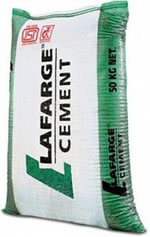FG, Lafarge sign pact to build 500 houses
The Group Managing Director, Lafarge Africa Plc, Mr. Guillaume Roux, has said that the firm will soon start work on the site allocated to it by the Federal Ministry of Lands, Housing and Urban Development to build 500 housing units in the Federal Capital Territory.
Roux stated this in an interview with journalists during the Nigerian Institute of Architects /Lafarge Africa Plc 1st Distinguished Lecture Series 2015 delivered by a former Vice President, Dr. Alex Ekwueme, in Abuja on Thursday.
He said that one of the company’s objectives was to help build better cities in Nigeria and that the country had tremendous potential and a large housing deficit of about 18 million units.
He said, “We are currently working hand-in-hand with the government, professionals and businesses to deliver more housing. For example, the Ministry of Lands, Housing and Urban Development has allocated land in Abuja to Lafarge to develop mass affordable housing.
“We have solutions for affordable housing through a partnership with LAPO Microfinance Bank and have impacted close to 2,000 people. We are currently working with architects to build iconic and architectural masterpieces with our range of cement and concrete products
“We are also working on a construction development lab, which we will use to develop more innovative products to meet local needs.”
Roux said Lafarge was also partnering with government at all levels to speed up the construction of infrastructure and houses.
He added, “Very recently, we signed a Memorandum of Understanding with the Ministry of Lands, Housing and Urban Development and they have allocated to us land in Abuja to showcase with 500 units and how we can help accelerate and build better housing solutions.
“We have also worked with the Ministry of Works and they have allocated to us some contractors relations in order to show what we can do regarding old buildings. We have solutions that can speed up construction and which will cost less.
“The government is looking at working more with less funds and that is why we think we can work together and help them.”
He said that in addition, Lafarge was in partnership with the Works ministry and other institutions to build concrete roads
Roux added, “We are partnering with the Nigerian Institute of Architects because they contribute more to the building of a more beautiful Nigeria.
“For the past two years, we have worked very hard to develop solutions for more durable concrete that will last longer. We have developed very light concrete that can be as solid as steel that can even last up to 100 years instead of having to be changed every five years.
“In order to implement those solutions either for houses or bridges, we need architects and it is very important for us to develop those relationships so that we can showcase to them the very solutions, essentially concrete solutions that can be beautiful.
“In the past in Nigeria, we contributed to the construction of the Cocoa House, the National Assembly complex and a lot of iconic buildings and structures, and we now have to partner with experts.
“As you are all probably aware, Nigeria estimates a housing deficit of 18 million and at Lafarge; we believe we can contribute to reducing this number”
On the possibility of reducing the cost of cement, Roux said what was important was the cost of construction.
He said, “What we want to do is to improve the cost of construction so that it will cost less to finish a building. This is why we are finding more and more solutions so that the cost of construction is improved. We want to achieve stability in the prices of building materials.”
Ekuweme advised the incoming administration of President-elect, Maj.-Gen. MuhammaduBuhari, not to approach infrastructure development haphazardly.
He urged Buhari and his team to develop a comprehensive master plan and follow it meticulously in line with the urgent infrastructure needs of the country
Ekuweme warned against trying to embark on development of all spheres of national infrastructure at the same time without definite plans, saying this had largely been responsible for the failure of successive governments to achieve concrete infrastructure development in the country
He said, “My advice is that the incoming government should develop a comprehensive master plan on infrastructure development. It could be five years or 10 years development master plan based on budget constraints.
“There is also the need to have a yearly plan on implementation. But when you try to build roads, railways, waterways and so on at the same time without a definite plan, then you have issues of abandoned projects and failure to achieve desired development needs of the people.”
The former vice president blamed the problem of frequent building collapse in the country on the engagement of quacks and non-professionals by contractors.
PUNCH.


